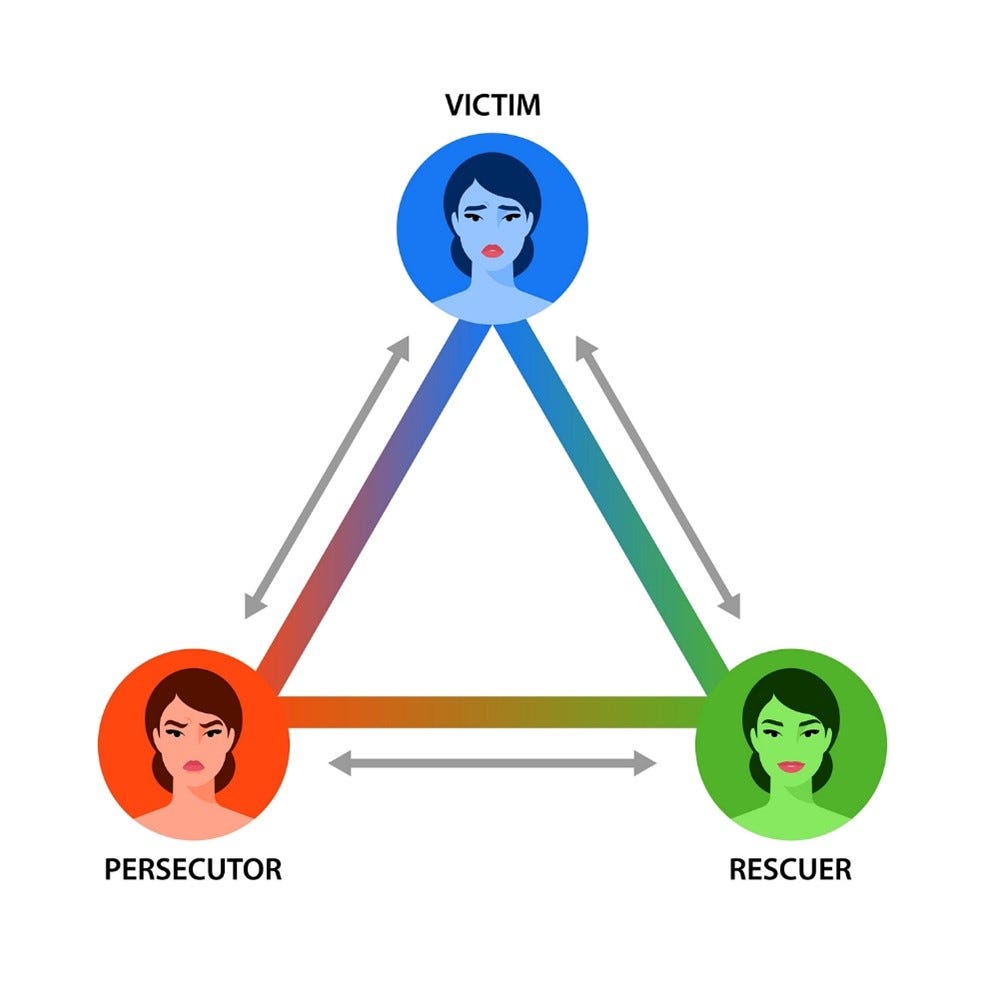How to Escape Your Drama Triangle, Part I
If you act like a Victim, soon you'll be cast as the Perpetrator.
I write Toxic Workplace Survival Guy because toxic workplaces make me angry. I want to help as many people as possible do as I did: survive long enough to emerge with my mental health, dignity and career intact, on my own terms. A big thank-you to all those who’ve become paid subscribers.
And if you think Toxic Workplace Survival Guy might help somebody you know, please click the button below to refer a friend. I’m offering a chance to nominate my next post (five referrals); request a video on a specific topic (10 referrals); and a free 45-minute consultation on navigating your toxic workplace (25 referrals) in recognition of your support. Thank you!
Survival Tool#12: Escape Your Drama Triangle
Many know the term “Drama Triangle.”
Few recognise this structure as the basic building block of their toxic workplace.
Understanding the Drama Triangle — and the Victim, Perpetrator and Rescuer roles that form its pillars — is vital knowledge.
Because if you’re stuck (for now) in a toxic workplace, then you’re also stuck in a Drama Triangle — without even knowing.
You must understand this dynamic if you’re going to find a way out.
This is such an important topic that I’m splitting this edition of Toxic Workplace Survival Guy into two parts.
Part One (this one) reveals how you’re unwittingly enrolling yourself in the Drama Triangle, and will end up playing both Victim and Perpetrator as a result.
Part Two will show you how to dissolve the Drama Triangle by re-imaging your predicament through the lens of Creator, Challenger and Coach, after David Emerald’s work in his book The Power of TED (*The Empowerment Dynamic).1
What is the Drama Triangle?
The Drama Triangle’s origins go back to 1964, when American psychiatrist Eric Berne published a five million-copy bestseller called The Games People Play. The book unpacked Berne’s theory of relationships, which he dubbed Transactional Analysis.
Berne believed that we mostly relate to one another via habitual, unconscious patterns resembling games — only with unspoken rules. Transactional Analysis reveals how these games play out, so you can make different choices.
In 1969, Berne’s student Stephen Karpman built on his mentor’s work to develop the concept of the Drama Triangle, comprised of three participants:
Victim: Feels powerless and often gives up on what they want. Believing the world to be against them, they disengage, complain, and feel angry, resentful and envious of others. Difficulties making decisions, solving problems or enjoying life. Looking for a Rescuer to solve their problems. Says things like:
“I’m not good enough.”
“This always happens to me.”
“Poor me.”
Persecutor: Blames, criticizes and acts superior to the Victim. Certain they know best, they’re poor listeners who ignore what others think. Use criticism to shame the victim into apologising. Persecutors are always former Victims. Says things like:
“That person will get what’s coming to them.”
“I must win at all costs.”
“Who’s to blame for this?”
Rescuer: Well-meaning and sincere, the Rescuer wants to repair the relationship between the Victim and Persecutor, but they’re motivated by low self-worth and a desire to avoid looking at their own wounds. While a Rescuer thinks they’re being helpful, they’re actually feeding the drama by adding more energy to the dance, and often feel underappreciated. Says things like:
“Let me help you.”
“You need me.”
“I help so many people but nobody’s there for me.”
The Iron Law of the Drama Triangle
There’s an absolutely crucial thing to know about the Drama Triangle:
Once you’ve assumed one of the roles, you’ll inevitably end up playing the other two as well.
It’s an iron law.
Yes — that’s a hard law to accept.
How can I — the Victim — be a Perpetrator?
It seems impossible.
So let’s break it down.
How the Roles Swap Around
If you’re stuck in a toxic workplace (for now), then you most likely identify with the role of Victim.
Keep reading with a 7-day free trial
Subscribe to Toxic Workplace Survival Guy to keep reading this post and get 7 days of free access to the full post archives.





